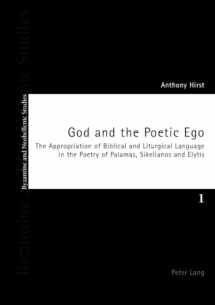
God and the Poetic Ego: The Appropriation of Biblical and Liturgical Language in the Poetry of Palamas, Sikelianos and Elytis (Byzantine and Neohellenic Studies)
ISBN-13:
9783039103270
ISBN-10:
303910327X
Edition:
New
Author:
Anthony Hirst
Publication date:
2004
Publisher:
Peter Lang AG, Internationaler Verlag der Wissenschaften
Format:
Paperback
425 pages
FREE US shipping
Book details
ISBN-13:
9783039103270
ISBN-10:
303910327X
Edition:
New
Author:
Anthony Hirst
Publication date:
2004
Publisher:
Peter Lang AG, Internationaler Verlag der Wissenschaften
Format:
Paperback
425 pages
Summary
God and the Poetic Ego: The Appropriation of Biblical and Liturgical Language in the Poetry of Palamas, Sikelianos and Elytis (Byzantine and Neohellenic Studies) (ISBN-13: 9783039103270 and ISBN-10: 303910327X), written by authors
Anthony Hirst, was published by Peter Lang AG, Internationaler Verlag der Wissenschaften in 2004.
With an overall rating of 4.0 stars, it's a notable title among other
books. You can easily purchase or rent God and the Poetic Ego: The Appropriation of Biblical and Liturgical Language in the Poetry of Palamas, Sikelianos and Elytis (Byzantine and Neohellenic Studies) (Paperback) from BooksRun,
along with many other new and used
books
and textbooks.
And, if you're looking to sell your copy, our current buyback offer is $0.3.
Description
The Greek Bible and the services of the Orthodox Church have proved a rich source of language for many poets of modern Greece, and perhaps for none more than for Kostis Palamas, Angelos Sikelianos and Odysseas Elytis, whose overlapping careers span the period 1876-1996. A blurring of the boundaries between Orthodoxy and ‘Greekness’ (hellênikotêta, which all three poets celebrate) has often led critics to assume from the Christian borrowings in the poetry the Christian allegiance of the poets. Through detailed analyses of selected poems, focusing on their relation to Biblical and liturgical source texts, this book questions whether the work of these poets is compatible with Christianity at all. It asks whether a Christ who is assimilated, along with the Virgin Mary, into the ancient Greek pantheon, or presented as a symbol of Beauty, or as object of the erotic desire of the women of the Gospels is still within the realm of Orthodoxy. Above all it asks whether, when the poetic ego appropriates to itself words which in their original context belong to Christ or Jehovah, there is any room left for the divine, or whether the poet has not in fact elbowed God off the stage altogether.


We would LOVE it if you could help us and other readers by reviewing the book
Book review

Congratulations! We have received your book review.
{user}
{createdAt}
by {truncated_author}


